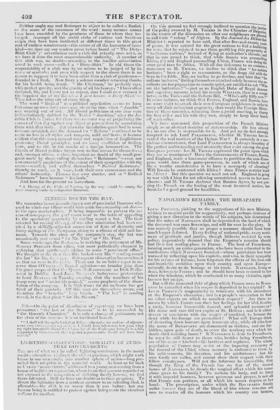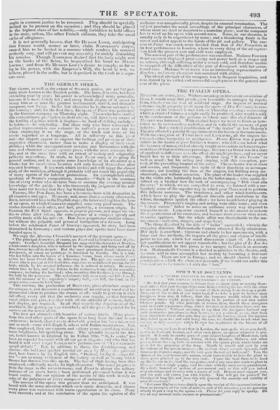NAP(1)LEON'S REMAINS : THE BONAPARTE FAMILY.
Loris Pui mem:, yielding to the suggestions of his IICW Minister, wishing to acquire credit for magnanimity, and perhaps desirous of giving a new direction to the minds of his subjects has determined that the ashes of NAPOLEON shall be deposited in ;he land of whkh the deceased was once Sovereign, and will for ever be the glory. It was measly possible that so proper a measure should have been much longer deferred. Every fheling of national pride, every senti- ment of gratitude and justice, though hitherto resisted by state policy, imperatively demand that the Emperor's remains should ment of gratitude and justice, though hitherto resisted by state policy, imperatively demand that the Emperor's remains should find their last resting-place in France. The host of Frenchmen, forming nearly an entire generation, who have been educated in the institutions which NAPOLEON founded—whose patriotism has been warmed by reflecting upon his exploits, and wlio, in their sympathy
for his reverse of Ibrtune, have fbrgotten the effects of' his iron rule and insatinble ambition upon thor country and upon Europe—
naturally desire to do homage at his tomb. NAPOLEON, living or dead, beloegs to France; and he should have been restored to her when the tricolour, which he condueted to so many victories, again became her ensign.
But will the immortal debt of glory which France owes to Num- nvos: be cancelled when his corpse is deposited in her capital? Is Louis Pinsieee's magnanimity to terminate with his attendance
at the Emperor's obsequies ; and is a people's veneration to find no ether objects on which to manifest respect ? Are there no
means by which France can shew her feelings fbr her idol, besides a tardy, however honourable Amend, and splendid monument? his mune and race did not expire at St. Helena ; and is it either decent or consistent with the usages of moulded, to honour the dead while his lineage are proscribed ? What will Europe think of showering down honours upon insensate elsy, while all who beat' the name of Borsaraiers are denounced as traitors, and arc for- bidden, upon pain of' death, to enter the territory over which his deeds shed unfailing lustre ? If NseossoN io dear to Erenclunen, he must lie still dearer to those who, besides being Frenclunen, nre of' his nearest kindred—his brothers and uephews. The whole population of France may assist at the imposing ceremony of the Commitl of the Chief, whose memory is endeared to them by his achievements, his devotion, and his misthrtuues; but his own family are exiles, and cannot show their respect with their fellow countrymen. Will not the inference be irresistible, that
though the "king of the French has no fear of the sacred bones of N.Apoi.E., be dreads the magical efThet which his name alone gives to his tinnily ? To reclaim his body, and to inter
it with imperial honours, however generous and proper, is not all that }TIMM con perform, or all whthh his manes require at her hands. The proscription, under which the BoaaraaTE family
suffer because they are of the blood of him whose remains are now to receive all the honours which his country can bestow,
ought in common justice to be removed. They should be specially invited to be present on the occasion ; and they should be placed M the highest class of her nobility,—only forbidden to hold offices in the state, unless, like other French citizens, they take the usual caths of allegiance.
It is not generally known, that Sir HUDSON LOWE, anticipating that France would, sooner or later, claim NAPOLEON'S corpse, caused him to be buried in a manner which renders his removal perfectly easy, and will prevent any necessity for rudely disturbing his remains. Though NAPOLEON desired that his body might rest on the banks of the Seine, be bequeathed his heart to Mame LotusE ; and front Sir Hunsols Lown's desire to comply, as far as lay in his power, with the Emperor's Will, the heart is not, we believe, placed in the coffin, but is deposited in the tomb in a sepa- rate case.



























 Previous page
Previous page